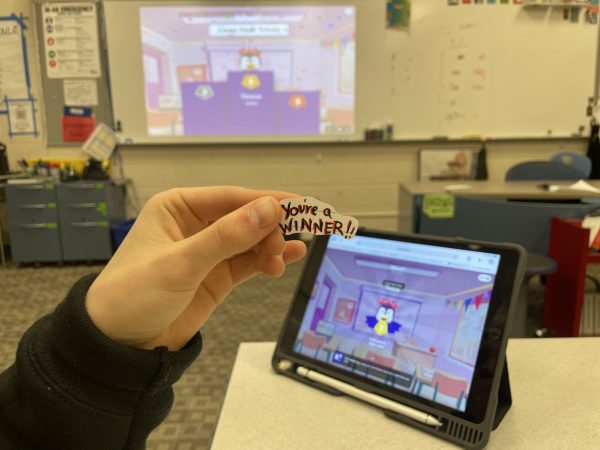Understanding idioms: connecting languages in ways you’d never imagine
We aren’t endorsing animal abuse when we say “to kill two birds with one stone,” and we aren’t really comparing our math test to dessert when we say it was “a piece of cake.” If we took these odd sayings, called idioms, literally, we would be living in a very crazy world. As native speakers we know they are just expressions, but for non-native speakers, idioms present a challenge.
“A lot of students, when learning a language, are looking for the ability to transfer that information into their first language,” Kelly Pinard, Spanish teacher, said. “Idioms are characterized by not being directly translatable. If you do, they tend to have a meaning that doesn’t make sense to a non-native speaker, which causes a lot of confusion. The student may not have the background knowledge of a culture so they don’t know the reason why that idiomatic phrase is being used. It’s just a memorized phrase. It doesn’t have the same feel as it does for a native speaker.”
Senior Amira Serour knows this first hand. She moved to Lake Zurich from Egypt two and a half years ago. Although she has been learning English since she was about five years old and German since she was in sixth grade, she knows the obstacles of learning idioms well.
“It’s challenging because you have to know not only the literal meaning of the word, you have to know the deeper meaning,” Serour said. “It’s double effort for one word. It’s like [analyzing in English] class, if you are a clock, you present time, but at the same time, you can represent death because time goes by so fast. These sayings are like symbols.”
Most people do not know exactly where or when idioms developed, but if you look though different works of literature, you can find evidence of them everywhere. William Shakespeare, for example, uses the idea of being “green with envy” in multiple different works.
“Idioms develop over time, like if their grandparents said something and it sticks, it continues into something bigger,” Pinard said. “[Idioms] are often regional, even different in the south compared to the north, so they have a lot to do with the regional culture and things that are common or important there. It can reflect familiarity within a culture.”
Even though idioms can be difficult to understand at first, once you look closer at them, in some instances you can find many similarities between languages. Not all sayings will have exact parallels in other languages, though. The following Arabic is written in a style called Franco-Arab, which is a relatively modern way of typing Arabic with English letters and symbols as opposed to the traditional way of writing it, according to Serour.
“There’s a saying: ‘Elle 5arag men daroo, et2al me2daro.’ It’s hard to say in English. I’ll try to explain it: if you go to Egypt, is anyone going to know you? Is anyone going to treat you as you were treated here? No. He’s not treated the same way as he was in his country,” Serour said. “It basically means, ‘Whoever got out of his home is treated like a stranger,’ and his home is Egypt, or any other country. It’s where the heart, where the family, where the friends, where your childhood, where your every single thing is. You just came here by your body. Everything else is over there.”
Even though there are not always direct sayings in other languages that correlate with ones in English, many languages share the core values expressed in idioms.
“Similar languages have similar meanings,” Ziarnak said. “Like, for example, ‘to bite the dust’ in English would translate to ‘bite into the grass’ in German. So the English version is going a little lower down [in the earth].”
When you get down to it, one must understand the real concepts behind idioms to understand how they are used and why.
“I think similar concepts are used for idioms and similar ideas,” Pinard said. “For ‘it’s raining cats and dogs,’ you can find similarities in other languages where they may say it is raining really hard. They just say it in a different way.”
Pinard says even after speaking Spanish for so many years and living in Mexico, some Spanish idioms are still confusing to her at first. She is not alone.
“Raining cats and dogs always confused me,” Serour said. “Like, why cats and dogs? What does that have to do with the rain? An idiom is a “word or phrase that has a meaning different from what it sounds like,” according to Andrew Ziarnak, German teacher. The problem with learning idioms is when they are directly translated to other languages, word for word, they do not make sense.
Common Idioms
What we say: I’m crossing my fingers.
What German speakers say: Ich drücke dir den Daumen.
Literal translation: I am pressing my thumbs.
What we say: I couldn’t care less.
What German speakers say: Das ist mir Wurst.
Literal translation: To me, it’s sausage.
What we say: make a mountain out of a molehill
What German speakers say: Er macht einen Elefanten aus einer Mücke
Literal translation: make an elephant out of a mosquito
What we say: to be loaded
What German speakers say: Geld wie Heu haben
Literal translation: to have money like hay
What we say:
What Arabic speakers say: El Tesht 2aly ya Helwa Yally omy esta7amy
Literal translation:
What we say: to be a thorn in one’s side
What German speakers say: Das ist mir ein Dorn im Auge.
Literal translation: to be a thorn in one’s eye
What we say: One good turn deserves another.
What German speakers say: Eine Hand wäscht die andere.
Literal translation: One hand washes the other.
What we say: bite the dust
What German speakers say: ins Grass beißen
Literal translation: bite the grass
What we say: something to complain about; a fly in the ointment
What German speakers say: ein Haar in der Suppe
Literal translation: to find a hair in your soup
What we say: My hair stood on end.
What German speakers say: Mir standen die Haare zu Berge.
Literal translation: My hair stood on mountains.
What we say: down to the wire
What Arabic speakers say: el 2atr hayfolak
Literal translation: you’ll miss the train
What we say: hold your horses
What Arabic speakers say: Emsek nafsak
Literal translation: control yourself
What we say: to get it off your back
What Arabic speakers say: Tala3 el mesta5aby
Literal translation: get if off your stomach
What we say: green with envy
What Arabic speakers say: Hawala3 feha be gas
Literal translation: I’ll burn you up.
What we say: tie the knot
What Arabic speakers say: Hatgawez
Literal translation: you’ll meet your groom
What we say: play hard to get
What Arabic speakers say: et2al 3al roz yestewee
Literal translation: play until rice is well cooked
What we say: break a leg
What Arab speakers say: kasary
Literal translation: break it in half










